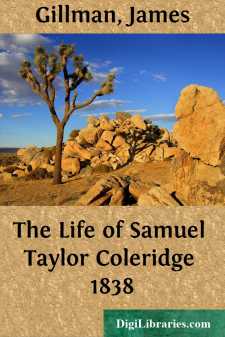Categories
- Antiques & Collectibles 13
- Architecture 36
- Art 48
- Bibles 22
- Biography & Autobiography 813
- Body, Mind & Spirit 142
- Business & Economics 28
- Children's Books 15
- Children's Fiction 12
- Computers 4
- Cooking 94
- Crafts & Hobbies 4
- Drama 346
- Education 46
- Family & Relationships 57
- Fiction 11828
- Games 19
- Gardening 17
- Health & Fitness 34
- History 1377
- House & Home 1
- Humor 147
- Juvenile Fiction 1873
- Juvenile Nonfiction 202
- Language Arts & Disciplines 88
- Law 16
- Literary Collections 686
- Literary Criticism 179
- Mathematics 13
- Medical 41
- Music 40
- Nature 179
- Non-Classifiable 1768
- Performing Arts 7
- Periodicals 1453
- Philosophy 64
- Photography 2
- Poetry 896
- Political Science 203
- Psychology 42
- Reference 154
- Religion 513
- Science 126
- Self-Help 84
- Social Science 81
- Sports & Recreation 34
- Study Aids 3
- Technology & Engineering 59
- Transportation 23
- Travel 463
- True Crime 29
The Life of Samuel Taylor Coleridge 1838
by: James Gillman
Description:
Excerpt
PREFACE.
The more frequently we read and contemplate the lives of those eminent men so beautifully traced by the amiable Izaak Walton, the more we are impressed with the sweetness and simplicity of the work. Walton was a man of genius—of simple calling and more simple habits, though best known perhaps by his book on Angling; yet in the scarcely less attractive pages of his biographies, like the flowing of the gentle stream on which he sometimes cast his line, to practise "the all of treachery he ever learnt," he leads the delighted reader imperceptibly on, charmed with the natural beauty of his sentiments, and the unaffected ease and simplicity of his style.
In his preface to the Sermons of (that pious poet and divine,) Dr. Donne, so much may be found applicable to the great and good man whose life the author is now writing, that he hopes to be pardoned for quoting from one so much more able to delineate rare virtues and high endowments: "And if he shall now be demanded, as once Pompey's poor bondman was, who art thou that alone hast the honour to bury the body of Pompey the great?" so who is he who would thus erect a funeral pile to the memory of the honoured dead? …
With the writer of this work, during the latter twenty years of his life, Coleridge had been domesticated; and his intimate knowledge of that illustrious character induces him to hope that his present undertaking, "however imperfectly it may set forth the memory he fain would honour," will yet not be considered presumptuous; inasmuch as he has had an opportunity of bringing together facts and anecdotes, with various memoranda never before published, some of which will be found to have much of deep interest, of piety and of loveliness.
At the same time he has also been desirous of interweaving such information as he has been enabled to collect from the early friends of Coleridge, as well as from those of his after-life. Thus, he trusts, he has had the means of giving, with truth and correctness, a faithful portraiture of one whom he so dearly loved, so highly prized. Still he feels that from various causes, he has laboured under many and great difficulties.
First, he never contemplated writing this Memoir, nor would he have made the attempt, had it not been urged on him as a duty by friends, whom Coleridge himself most respected and honoured; they, "not doubting that his intimate knowledge of the author, and dear love to his memory, might make his diligence useful."
Secondly, the duties of a laborious profession, rendered still more arduous by indifferent health—added to many sorrows, and leisure (if such it might be called,) which permitted only occasional attention to the subject—and was liable to frequent interruptions; will, he flatters himself, give him a claim to the candour and kindness of his readers. And if Coleridge's "glorious spirit, now in heaven, could look down upon him, he would not disdain this well meant sacrifice to his memory—for whilst his conversation made him, and many others happy below, his humility and gentleness were also pre-eminent;—and divines have said, those virtues that were but sparks upon earth, become great and glorious flames in heaven."


